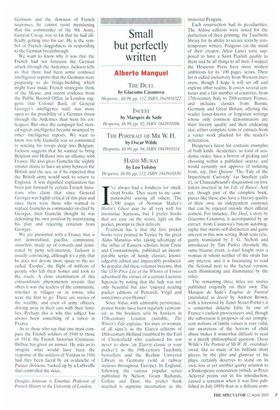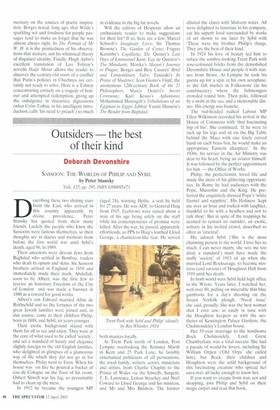Small but perfectly written
Alberto Manguel
THE DUEL by Giacomo Casanova Hesperus, £6.99, pp. 112, ISBN 1843910322 INCEST by Marquis de Sade Hesperus, £6.99, pp. 92, ISBN 1843910306 THE PORTRAIT OF MR W H. by Oscar Wilde
Hesperus, £6.99, pp. 94, ISBN 1843910314
HADJI MURAT by Leo Tolstoy
Hesperus, £6.99, pp. 112, ISBN 1843910330
I've always had a fondness for small, short books. They seem to me companionable among all others. The 1,300 pages of Norman Mailer's Harlot's Ghost may be all very well for insomniac Samsons, but I prefer books that are easy on the wrists, light on the pocket, prompt in their delivery.
Tradition has it that the first pocket books were printed in Venice by the great Aldus Manutius who, taking advantage of the influx of Eastern scholars from Crete and Constantinople, published an incomparable series of handy classics, knowledgeably edited and impeccably produced. So popular did these volumes become, that the 1536 Price List of the Whores of Venice advertised the virtues of a certain Lucrezia Squarcia by noting that the lady was not only beautiful but also 'enjoyed reading pocket editions of Petrarch, Virgil and sometimes even Homer'.
Since Aldus, with admirable persistence, pocket books have been regularly reinvented: as the booklets sold by hawkers in 17th-century London (suitable, The Winter's Tale explains, 'for man, or woman, of all sizes'); as the Elzevir editions of 18th-century Holland (snubbed by the Earl of Chesterfield who cautioned his son never to show 'an Elzevir classic in your pocket"); as the 19th-century Tauchnitz bestsellers and the Reclam Universal Library in Germany (sold at railway stations throughout Europe). In England, following the various popular series published by Nelson, Grant Richards, Collins and Dent, the pocket book reached is supreme incarnation as the Each resurrection had its peculiarities. The Aldine editions were noted for the perfection of their printing; the Tauchnitz library for its ability to secure texts by contemporary writers. Penguins (in the mind of their creator, Allen Lane) were supposed to have a Saint Paulish quality to them and be all things to all men. I suspect the Hesperus Press have more modest ambitions for its '100 pages' series. Their list is culled exclusively from Western literature, though I hope it will set off and explore other realms. It covers several centuries and a fair number of countries, from 17th-century Italy to 20th-century France, and includes classics from Russia, Germany and Great Britain, offering the reader lesser-known or forgotten writings whose only common denominators are their literary quality and their endearing size, either complete texts or extracts from a vaster work plucked for the reader's delectation.
Hesperus's latest list contains examples of both kinds. Academics, so fond of academic order, have a horror of picking and choosing within a published oeuvre, and would certainly not approve of isolating from, say, Don Quixote The Tale of the Impertinent Curiosity' (as Smollett calls it), or Chateaubriand's disquisition on love letters inserted in his Life of Rance. And yet, though part of the complete book, pieces like these also have a literary quality of their own, an independent existence that can be enjoyed outside their official context. For instance, The Duel, a story by Giacomo Casanova, is accompanied by an extract from Casanova's buxom autobiography that merits self-distinction and gains interest in this new setting. Both texts (elegantly translated by J. G. Nichols and introduced by Tim Parks) chronicle the same bizarre event, a duel fought over a woman in whom neither of the rivals has any interest, and it is fascinating to read the fictional next to the factual version, each illuminating and illuminated by the other.
The remaining three titles are stories published originally on their own. The Marquis de Sade's Eugenie de Franval (translated as Incest by Andrew Brown, with a foreword by Janet Street-Porter) is a somewhat didactic fable by one of France's earliest provocateurs and, though the subversion it proposes of our complacent notions of family values is ever valid, our awareness of the horrors of child abuse makes it somewhat difficult to read as a purely philosophical question. Oscar Wilde's The Portrait of Mr W. H., overshadowed, like so many of his brilliant short pieces, by the glitz and glamour of his plays, certainly deserves to stand on its own, less as yet another quirky solution to a Shakespeare conundrum (which, as Peter Ackroyd points out in his introduction, caused a sensation when it was first published in July 1889) than as a delicate corn mentary on the sources of poetic inspiration. Borges noted, long ago, that Wilde's sparkling wit and fondness for purple passages tend to make us forget that he was almost always right. In The Portrait of Mr W H. it is the pointedness of his observations that matters, not his whimsical theory of disguised identity. Finally, Hugh Aplin's excellent translation of Leo Tolstoy's novella Hadji Murat allows the reader to discover the century-old roots of a conflict that Putin's policies in Chechnya are certainly not ready to solve. Here is a Tolstoy concentrating entirely on a tragedy of honour and attempted redemption, giving up the indulgence in discursive digressions (what Colm Toibin, in his intelligent introduction, calls 'Ilk need to preach.) so much
in evidence in the big fat novels.
Will the editors of Hesperus allow an enthusiastic reader to make suggestions for their list? If so, here are a few: Marcel Schwob's Imaginary Lives; Sir Thomas Browne's The Garden of Cyrus; Frigyes Karinthy's Capillaria; De Quincy's Last Days of Emmanuel Kant: Eca de Queiroz's The Mandarin; MOrike's Mozart's Journey to Prague; Borges and Bioy Casares' Brief and Extraordinary Tales; Tanizaki's In Praise of Shadows; Jean Giono's Virgil; the anonymous 12th-century Book of the 21 Philosophers; Marco Denevi's Secret Ceremony; Karl Kraus's Aphorisms; Mohammed Mostagab's Tribulations of an Egyptian in Egypt; Jabbar Yassin Hussein's The Reader from Baghdad.



































































 Previous page
Previous page